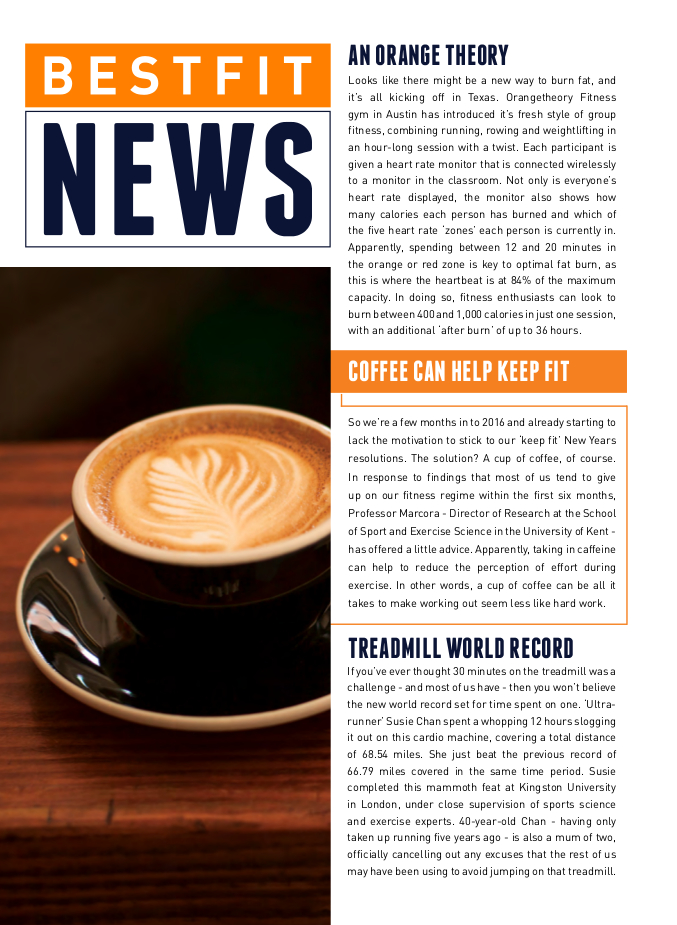Is Coffee good or bad?
Share
Coffee. Is it good or is it bad?
70 Million cups of coffee are drunk in one single day in the UK alone, and whilst it is obvious that we love the stuff, we can’t help but wonder: Is coffee good or is it bad for you?
Dr Michael Barnish is Head of Genetics and Nutrition at REVIV (www.revivme.com) and has spoken to BESTFIT Magazine to explain how coffee works for each individual and whether it actually has benefits. Because not EVERYTHING that tastes good has to be bad for us, right?
Coffee is one of the most nutrient dense drinks on the planet, offering amazing phytonutrients and flavonoids that are exceptional for supporting good health. There you have it, coffee IS good for you. But it is not quite that simple I am afraid. The wonderful coffee plant evolved eons ago in response to a bug attack. To counteract it being devoured constantly by bugs the coffee plant evolved to produce a neurotoxic bug killer that we today call caffeine. Tea did the same!
The answer to whether coffee works well for you is absolutely locked within your genes. Genetic advances have made it now common place to explore the secrets within your genetic make-up and we can test to see what effect coffee has on each individual. Coffee is the world’s most popular drink, and many people rely on its bitter tasting buzz to get through their day. However, it is not actually the coffee part that makes us doubt whether the drink is healthy or not for us, it is the caffeine.
Caffeine is a neurotoxic agent and can be deadly if you are an insect. However, for us much larger humans, caffeine is not deadly but offers us a neuro buzz. But it IS still a neurotoxic agent which can cause plenty of responses in our bodies.
Not only does it play around with our nervous systems chemical signalling, it can linger in the cardiovascular system and cause inflammation – and inflammation in the blood vessels is the first stage of plaque formation. Caffeine will also stop you making new, fresh strands of collagen, so if beauty is important to you, don’t be fooled with face products that promote caffeine. It just draws the blood to the surface to promote a nice complexion for a short time, but it will absolutely interfere with your collagen production.

So how do our genes determine whether it is a healthy super food or just a detrimental health demon?
It comes down to the gene and enzyme, CYP1A2. This natural enzyme in our body is responsible for breaking down many things and caffeine is among its workload. We are all made differently, and variations of this gene means that some people have a super-fast action of this enzyme and in some people, the enzyme works extremely slowly. It is this variation that determines whether coffee is beneficial or detrimental to your health.
You may be asking yourself which gene you have?
Those that have a super-fast CYP1A2 enzyme can break caffeine down quickly. They are often the people that can drink a cup before bed and still sleep like a log. As it is broken down fast, the caffeine isn’t lingering in the body for long enough to be too problematic and you are left with that glorious phytonutrient rich soup for all of its incredible health benefits.
On the other hand, if you have a sluggish CYP1A2 enzyme, you are not going to be brilliant at clearing the caffeine and therefore it will linger in your skin and age you or help to inflame your cardiovascular system. It will certainly give you a crazy buzz that may last throughout the day.
So, the reality is…coffee is good for some people, but not so good for others. If you love your coffee, or tea and want to protect your health then it is certainly worth exploring a lifestyle genetic test to see if it has any actual benefits for you.
If it turns out that caffeine isn’t as much of a friend as you had hoped, then decaffeinated coffee is absolutely a more protective option for those with slow CYP1A2, but the process to decaffeinate the drinks does lead to loss of some of that amazing nutrition. So, I am afraid there is no win-win situation here for coffee lovers with a slow CYP1A2.















FOLLOW BESTFIT